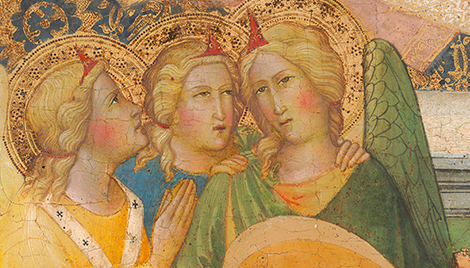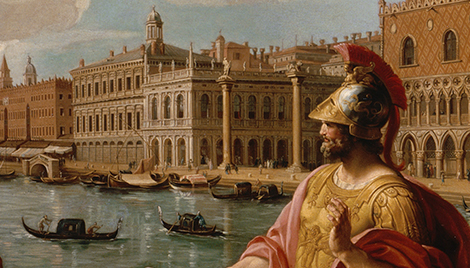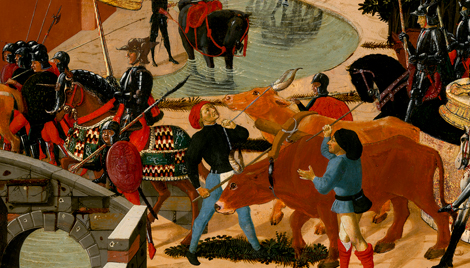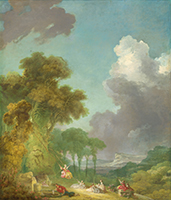Frequently Asked Questions
Fellowships
Who can apply for a fellowship?
The Kress Foundation supports a range of fellowships in art history, art conservation, art librarianship, art museum education and curation. For more information about the fellowship eligibility, review the Eligibility sections on our Fellowship pages.
How long after submitting my application will I hear the Foundation’s decision?
For History of Art Institutional Fellowships, notification is typically sent by the end of March.
For Conservation Fellowships, notification is usually sent four-to-six weeks after the all materials have been received.
Do I need to be ABD at the time of submission for the History of Art Institutional Fellowships?
Which transcript should I submit with my History of Art Institutional Fellowship application?
Is it possible to obtain feedback on unsuccessful applications for Fellowships?
Can individuals apply for a fellowship?
There are different application requirements for each fellowship.
History of Art Institutional Fellowships candidates must be nominated by their academic department and may then apply for the fellowship as individuals.
Conservation Fellowship applications must be submitted by the museum or conservation research facility that will host the fellowship.
How many fellows may be nominated per University/Institution per year?
For History of Art Institutional Fellowships, each university is limited to two (2) nominees per academic department. The nominees must be applying to different research centers.
I received a Kress fellowship last year. Will I receive a W-2 or similar statement for tax purposes?
Can an institution applying to host a Kress fellow enhance the fellowship stipend?
Does Kress award grants or fellowships to visual artists for study/travel/projects?
Grants
Does Kress support art history publications?
The Kress Foundation views its support of art history publishing as a key component of our grant programs and the Foundation seeks to ensure that the support we provide for publishing in art history has the greatest possible impact on the field; that we are supporting the most worthy publication projects in European art history; that we are serving, as equitably as possible, the entire range of fields (from antiquity to the early modern era) about which we care; that our support is being offered with transparency and across a level playing field with respect to the relevant publishers and prospective authors; and that the proposals we receive are being assessed as judiciously and in as well-informed a way as possible. With these goals in mind, the Foundation has established ongoing partnerships with key scholarly and professional organizations through which these organizations, themselves recipients of Kress funding, will administer our support for art history publishing in their key areas of interest, soliciting and assessing applications, and making appropriate awards.
Currently, the Foundation has partnerships in place with the Archaeological Institute of America, the International Center of Medieval Art and the Renaissance Society of America. The Foundation continues to accept applications for publications the scope of which fall outside the areas being supported in this way.
Does the Kress Foundation fund conservation analysis and treatment of art works?
The Foundation only supports conservation analysis and treatment of works from the distributed Kress Collection. Most such support is centralized at the Kress Program in Paintings Conservation at the Conservation Center of the New York University Institute of Fine Arts.
See also Conservation Fellowships.
Does the Kress Foundation fund the documentation of museum object collections?
To whom can the Kress Foundation award its grants?
International applicants that are not registered with the IRS must identify a U.S. non-profit as the fiscal sponsor for their proposal prior to beginning the application process. Applicants must provide a copy of the fiscal sponsor organization’s IRS Determination Letter, to confirm its 501(c)3 status, as well as a letter from the fiscal sponsor confirming they have independently vetted the project, approved it as appropriate to their mission and are willing to accept and administer full or partial funding, if awarded, without taking overhead or indirect expenses.
The Foundation does not award grants directly to individuals.
What are your deadlines for submission of an application?
| Grant Cycle | Grant Program | Portal Opens | LOI Submission Deadline |
| Spring | History of Art Conservation |
February 15 | March 1, 5:00PM EST |
| Fall |
History of Art |
August 15 | September 1, 5:00PM EST |
If an applicant has been invited to submit a full proposal to the Foundation, they will receive an email directing them back to the grantmaking portal. Institutions must submit their complete grant applications by the deadlines below in order to be eligible for an award from the Kress Foundation.
| Grant Cycle | Grant Program | Grant Application Deadline |
| Spring | History of Art Conservation |
April 1, 5:00PM EST |
| Fall | History of Art Conservation |
October 1, 5:00PM EST |
Can my university/organization submit multiple applications for different projects simultaneously?
Does the Kress Foundation allow for overhead/indirect costs to be taken out of grant funds?
Is it possible to receive copies of past successful applications?
The guidelines request a detailed budget. How specific should we be?
When will I hear of the Foundation’s decision regarding my grant request?
After the submission of a grant application, proposals are reviewed and applicants are typically informed of the Foundation's decision within four to six weeks of the grant deadline (April 1 or October 1).
Is it possible to obtain feedback or reviewers’ comments on unsuccessful applications for Grants?
Can I resubmit my application in the next grant cycle?
Where can I find organizations to apply to if my project is not appropriate for Kress support?
Does Kress award grants or fellowships to visual artists for study/travel/projects?
The Kress Collection
How do I obtain a reproduction of, or the rights to reproduce, a work in the Kress Collection?
What inspired Kress to make his art collection a “Gift to the Nation”?
How is the Kress Collection's provenance text formatted?
Whom should I contact about conserving a work of art in my institution's Kress Collection?
Are Kress Collection works available for loan by other academic or municipal museums?
The Kress Foundation is interested in having the Kress Collection serve the educational needs of academic and municipal museums around the country. In a recent development, the Foundation launched an effort to ascertain how many works in the Kress Collection might be made available for short- or long-term loan to other museums, especially campus museums that seek to support the study and teaching of early modern European art history and especially the global Renaissance. Many museums, of course, lack representative works of that era, and others that do have relevant collections often welcome the opportunity to enrich them with loans, especially in response to curricular needs. Our colleagues at the Georgia Museum of Art (University of Georgia) have been surveying the entire Kress Collection in order to learn what percentage of the distributed Kress collection is not on permanent display; which works might lend themselves, from a conservation perspective, to being shared with other museums; and above all, in what ways the potential creation of what we have tentatively called a “Kress Loan Network” might advance the Foundation’s mission to responsively support the study and appreciation of European art, especially in our colleges and universities. We are most grateful to William U. Eiland, Director of the Georgia Museum of Art, and his colleagues for carrying out this study on our behalf. And we look forward to sharing more information as it is available.





